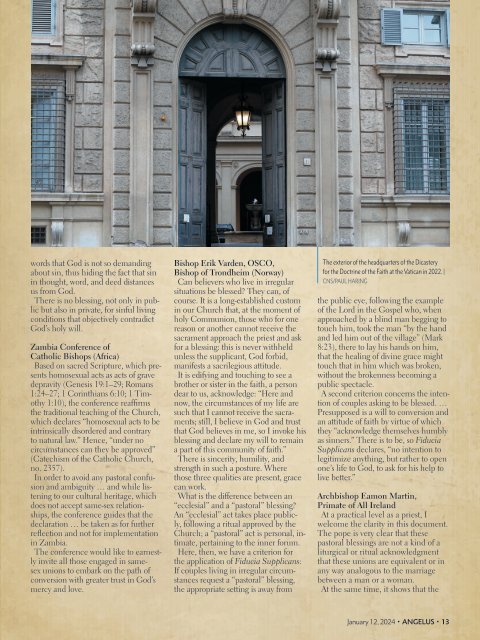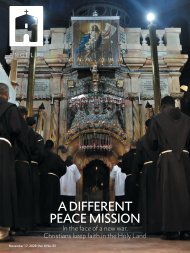Angelus News | January 12, 2024 | Vol. 9 No. 1
On the cover: The Vatican’s new document Fiducia Supplicans on blessings for those in same-sex or “irregular” relationships has probably left the average Catholic with more questions than answers. What does it really say, and why is it so controversial? On Page 10, we break down the saga of the document’s reception with a sampling of some key reactions that illustrate what’s at stake. On Page 20, John Allen explains why the impact of Fiducia on the global Church may be more limited than we think.
On the cover: The Vatican’s new document Fiducia Supplicans on blessings for those in same-sex or “irregular” relationships has probably left the average Catholic with more questions than answers. What does it really say, and why is it so controversial? On Page 10, we break down the saga of the document’s reception with a sampling of some key reactions that illustrate what’s at stake. On Page 20, John Allen explains why the impact of Fiducia on the global Church may be more limited than we think.
Create successful ePaper yourself
Turn your PDF publications into a flip-book with our unique Google optimized e-Paper software.
words that God is not so demanding<br />
about sin, thus hiding the fact that sin<br />
in thought, word, and deed distances<br />
us from God.<br />
There is no blessing, not only in public<br />
but also in private, for sinful living<br />
conditions that objectively contradict<br />
God’s holy will.<br />
Zambia Conference of<br />
Catholic Bishops (Africa)<br />
Based on sacred Scripture, which presents<br />
homosexual acts as acts of grave<br />
depravity (Genesis 19:1–29; Romans<br />
1:24–27; 1 Corinthians 6:10; 1 Timothy<br />
1:10), the conference reaffirms<br />
the traditional teaching of the Church,<br />
which declares “homosexual acts to be<br />
intrinsically disordered and contrary<br />
to natural law.” Hence, “under no<br />
circumstances can they be approved”<br />
(Catechism of the Catholic Church,<br />
no. 2357).<br />
In order to avoid any pastoral confusion<br />
and ambiguity … and while listening<br />
to our cultural heritage, which<br />
does not accept same-sex relationships,<br />
the conference guides that the<br />
declaration … be taken as for further<br />
reflection and not for implementation<br />
in Zambia.<br />
The conference would like to earnestly<br />
invite all those engaged in samesex<br />
unions to embark on the path of<br />
conversion with greater trust in God’s<br />
mercy and love.<br />
Bishop Erik Varden, OSCO,<br />
Bishop of Trondheim (<strong>No</strong>rway)<br />
Can believers who live in irregular<br />
situations be blessed? They can, of<br />
course. It is a long-established custom<br />
in our Church that, at the moment of<br />
holy Communion, those who for one<br />
reason or another cannot receive the<br />
sacrament approach the priest and ask<br />
for a blessing: this is never withheld<br />
unless the supplicant, God forbid,<br />
manifests a sacrilegious attitude.<br />
It is edifying and touching to see a<br />
brother or sister in the faith, a person<br />
dear to us, acknowledge: “Here and<br />
now, the circumstances of my life are<br />
such that I cannot receive the sacraments;<br />
still, I believe in God and trust<br />
that God believes in me, so I invoke his<br />
blessing and declare my will to remain<br />
a part of this community of faith.”<br />
There is sincerity, humility, and<br />
strength in such a posture. Where<br />
those three qualities are present, grace<br />
can work.<br />
What is the difference between an<br />
“ecclesial” and a “pastoral” blessing?<br />
An “ecclesial” act takes place publicly,<br />
following a ritual approved by the<br />
Church; a “pastoral” act is personal, intimate,<br />
pertaining to the inner forum.<br />
Here, then, we have a criterion for<br />
the application of Fiducia Supplicans:<br />
If couples living in irregular circumstances<br />
request a “pastoral” blessing,<br />
the appropriate setting is away from<br />
The exterior of the headquarters of the Dicastery<br />
for the Doctrine of the Faith at the Vatican in 2022. |<br />
CNS/PAUL HARING<br />
the public eye, following the example<br />
of the Lord in the Gospel who, when<br />
approached by a blind man begging to<br />
touch him, took the man “by the hand<br />
and led him out of the village” (Mark<br />
8:23), there to lay his hands on him,<br />
that the healing of divine grace might<br />
touch that in him which was broken,<br />
without the brokenness becoming a<br />
public spectacle.<br />
A second criterion concerns the intention<br />
of couples asking to be blessed. …<br />
Presupposed is a will to conversion and<br />
an attitude of faith by virtue of which<br />
they “acknowledge themselves humbly<br />
as sinners.” There is to be, so Fiducia<br />
Supplicans declares, “no intention to<br />
legitimize anything, but rather to open<br />
one’s life to God, to ask for his help to<br />
live better.”<br />
Archbishop Eamon Martin,<br />
Primate of All Ireland<br />
At a practical level as a priest, I<br />
welcome the clarity in this document.<br />
The pope is very clear that these<br />
pastoral blessings are not a kind of a<br />
liturgical or ritual acknowledgment<br />
that these unions are equivalent or in<br />
any way analogous to the marriage<br />
between a man or a woman.<br />
At the same time, it shows that the<br />
<strong>January</strong> <strong>12</strong>, <strong>2024</strong> • ANGELUS • 13

















